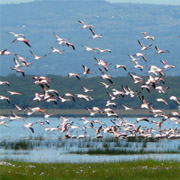Launch of a new report on Protected Areas
07 September 2012 | International news release
Jeju Island, Republic of Korea, 7 September, 2012 (IUCN) – Protected Areas –parks, nature reserves and other natural areas– assist in reducing deforestation, habitat and species loss, and support the livelihoods of over one billion people, while containing 15 % of the world’s carbon stock, according to a new report released today at the World Conservation Congress.
The Protected Planet Report 2012 finds that protected areas are growing in number and coverage of the earth’s surface, today comprising 12.7% of the world’s terrestrial area and 1.6% of the global ocean area.
“Protected areas have contributed significantly to conservation of the world’s biodiversity and an increase in their coverage and effectiveness is vital to a thriving planet and communities for the
future,“ says IUCN Director General Julia Marton-Lefèvre. “These rich natural areas are very important for people, who rely on them for food and clean water, climate regulation and reducing the impacts of natural disasters.”
The new report measures progress against the Aichi Targets, a set of goals released two years ago by the Convention on Biological Diversity (CBD) that included the objective of at least 17 % of the world’s terrestrial areas and 10 % of the world’s marine areas be effectively and equitably managed and conserved by 2020. The new report has been produced through a collaborative effort between IUCN and the UNEP World Conservation Monitoring Centre (WCMC), with other partners.
The report shows that from 1990 to 2010, global protected area coverage increased from 8.8% to 12.7% in terrestrial areas (including inland waters) and from 0.9% to 4% in marine areas under national jurisdiction. Current numbers, however, are well behind the Aichi targets, with under 13 % of the world’s terrestrial areas protected today, and just 1.6 % of the world’s ocean areas protected.
An area more than twice the size of Argentina comprising more than 6 million square kilometers of land and inland waters would have to be recognized as protected to meet the Aichi target. For oceans, an area more than the size of Australia comprising 8 million square kilometers would need to be recognized.
Protected areas are, however, diversifying rapidly in areas critical to their success, such as management and governance arrangements. According to the report, nearly half of the world’s protected areas are within sustainable-use areas and protected landscapes / seascapes, and nearly a quarter are managed by non-governmental actors or under co-management arrangements, often with indigenous peoples or local communities.
This is the first edition of the Protected Planet Report. It is scheduled to be published every two years, with the next edition planned in time for the IUCN World Parks Congress and the CBD COP (Conference of Parties) 12 in 2014. Future editions will provide updated information on progress towards the Aichi targets, as well as information on existing protected area indicators and progress towards protected areas connectivity.
Click here to download the report
www.iucn.org
www.facebook.com/iucn.org
www.twitter.com/iucn
For more information or to set up interviews, please contact:
• Brian Thomson, IUCN Media Relations, m +41 79 721 8326, email brian.thomsom@iucn.org
• Maggie Roth, IUCN Media Relations, m +41 79 104 2460, email maggie.roth@iucn.org



